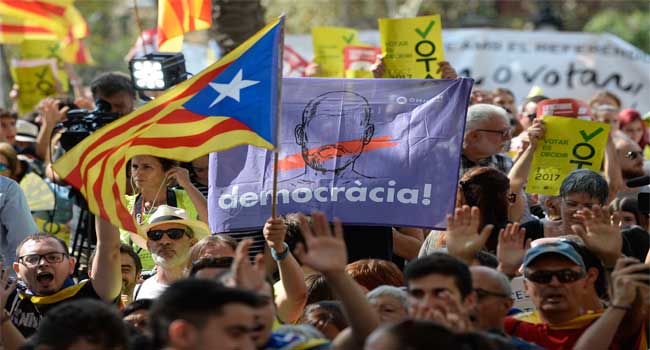
Spain said Thursday it will start seizing some of the Catalan regional government’s powers after its leader warned he could declare independence, drastically upping the stakes as Madrid battles to keep the country together.
The central government gave Catalan separatist leader Carles Puigdemont a Thursday morning deadline to abandon his bid to declare a breakaway state or face steps by Madrid to impose unprecedented direct rule over the semi-autonomous region.
Puigdemont, who sparked the country’s worst political crisis in decades on October 1 by holding a banned referendum on splitting from Spain, retorted that Catalan lawmakers could declare independence unilaterally if Madrid makes any such move.
Madrid could potentially suspend Puigdemont’s government or take over its police force under Article 155 of Spain’s constitution, a never-before-used provision that would take the country into uncharted legal waters.
There are fears this could spark unrest in a region where even Catalans who oppose independence cherish their autonomy, which includes control over healthcare, education and the police.
“That suspending our autonomy is the only response to all our efforts and our willingness to enter dialogue shows there is no understanding of the problem or willingness to talk,” Puigdemont wrote in a letter to Prime Minister Mariano Rajoy.
Madrid responded by accusing Puigdemont’s government of “deliberately and systematically seeking institutional conflict” and vowing to move ahead with Article 155.
It called an emergency cabinet meeting for Saturday to specify how it will take control over Catalonia. The measures would then have to be approved by the Senate, a process that may last until the end of the month.
As the accusations flew, Rajoy headed to Brussels for a summit with other EU leaders, where German Chancellor Angela Merkel and French President Emmanuel Macron offered him vocal support.
“We back the position of the Spanish government,” Merkel said as she arrived, while Macron told reporters the summit would be “marked by a message of unity” with Madrid.
The Catalan standoff has rattled the European Union that is already grappling with Brexit, while Rajoy’s government fears it will damage Spain’s tentative recovery from the financial crisis.
It is already taking a toll on one of Spain’s most important regional economies.
More than 900 companies have moved their legal headquarters out of Catalonia, citing the risk of instability, while Madrid has cut its national growth forecast for next year to 2.3 percent.
– Police raid –
Adding to the tensions Thursday, officers from Spain’s Guardia Civil force raided a Catalan police station seeking emails and phone records from referendum day, following accusations that regional police did little to stop the vote.
Catalonia’s 7.5 million residents are fiercely attached to their own language and culture but are divided on whether to break away from the rest of Spain.
Puigdemont says his regional administration has a mandate to declare independence from what he says was a 90-percent “Yes” vote, marred by a heavy-handed police crackdown on voters.
But turnout was given as only 43 percent. Many voters who oppose independence stayed away from a referendum that was declared illegal by Spain’s Constitutional Court.
Madrid had on Wednesday proposed fresh regional elections, sanctioned by the central government, as a potential way out of the crisis.
But Joan Tarda, a spokesman from the leftist ERC party which is part of Puigdemont’s coalition, told lawmakers in Madrid: “The Catalan government will not call elections.”
– ‘Collective suicide’ –
Catalonia’s La Vanguardia daily — Spain’s second-biggest newspaper — had urged Puigdemont in an editorial to back down and call elections.
“There’s no dignity in collective suicide, even less so when it’s decided by one person and everyone suffers,” it said in an editorial.
On the streets of the regional capital Barcelona, residents were jittery about the prospect of Madrid attempting to take over.
Martin Gutierrez, 36, expressed growing frustration with political leaders’ inability to end the deadlock.
“Neither Rajoy nor Puigdemont can be the people to solve this,” he said.
Pro-independence protesters were due to stage a rally outside central government offices in Barcelona at 1600 GMT.
Separatists complain that Catalonia, which represents about a fifth of Spain’s economic output, pours more into the national coffers than it gets back, and say it would prosper if it went its own way.
But opponents say the region has more clout as part of Spain and that the instability could be disastrous for its economy.
AFP
